Dr. Paul T. P. Wong’s autobiography, A Lifelong Search for Meaning: Lessons on Virtue, Grit, and Faith, is published in weekly installments. Stay updated here.
My Speech Impediment
As a child, I had the same stuttering problem as my mother. My stuttering became unbearable whenever I was emotionally upset. I am so thankful that this speech disorder did not continue into my adulthood. But I have also had a problem with articulation since my childhood days. Mother used to say something like, “You have a mouthful of horseshit” (I really do not know how to translate the actual phrase she used). I felt that my tongue was so thick that I could never articulate words clearly. This speech disorder became worse when I had to learn Cantonese as a refugee in Hong Kong. My Cantonese with a Mandarin accent was laughable. When I came to Canada, I spoke English with a mixture of both Cantonese and Mandarin accents, rendering my speech very difficult to understand. This articulation problem has haunted my teaching and speaking career all my life. Far too many times, I have been criticized for my accent. However, it hurts less and less as I have learned to accept and embrace my limitation. I have always managed to give an effective speech because of my other characteristics that are important for being a good teacher.Characteristics of Good Teachers
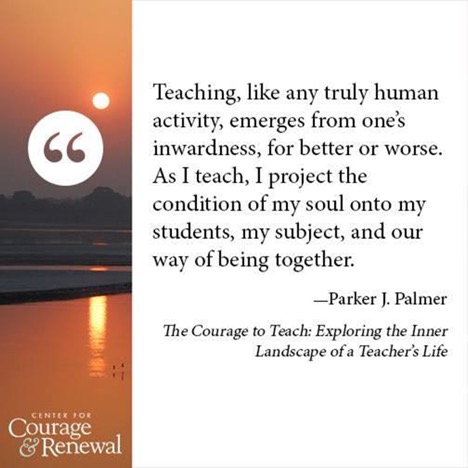 I am glad that teaching is much more than speaking. An important part of being a good teacher is the ability to share one’s inner life, as suggested by Parker Palmer.
I am glad that teaching is much more than speaking. An important part of being a good teacher is the ability to share one’s inner life, as suggested by Parker Palmer.
Whenever I share my heart and soul in addition to my knowledge, my students respond positively because they can sense that I really care about them and try to instill in them something more valuable than knowledge, such as a passion for learning, the challenge of critical thinking, and the courage to seek the truth. They can see that I model these values whenever I am teaching.
They can see right before their eyes how I wrestle with conceptual problems, and how I dare to challenge conventional wisdom, in search of a better understanding of any phenomenon under investigation. They can see my failures, frustrations, struggles, and true grit. They know that I am genuine. Students love to see authenticity in their teachers.
 Another important characteristic of effective teaching is a sense of humour. When I taught Psychology 101 to a few hundred students, they called me the Johnny Carson of psychology. Carson was a well-known talk show host, famous for his humour and one-liners.
Another important characteristic of effective teaching is a sense of humour. When I taught Psychology 101 to a few hundred students, they called me the Johnny Carson of psychology. Carson was a well-known talk show host, famous for his humour and one-liners.
The Key to Effective Preaching
I cut my teeth on teaching from preaching, when I was a Bible School student. In our preaching class at the Toronto Bible College, we were often asked to give a five-minute impromptu sermon on any given text. It was a nerve-wracking experience, especially when I had to worry about presenting the message as well as finding the English vocabulary to express it. To my surprise, my professor always overlooked my language difficulty and complimented me for the passion and the message I offered. This positive experience gave me the courage to preach in English and translate it to Cantonese at the same time without an interpreter when I started the Toronto Chinese Gospel Church in the early 1960s (Chapter 18). I often felt sorry for my congregation, who had to suffer through my terrible English and Cantonese.
This positive experience gave me the courage to preach in English and translate it to Cantonese at the same time without an interpreter when I started the Toronto Chinese Gospel Church in the early 1960s (Chapter 18). I often felt sorry for my congregation, who had to suffer through my terrible English and Cantonese.
I am grateful that God prepared me for a teaching career through preaching. My first teaching assignment at Trent University was to teach Psychology 101, and I was able to hold the students’ interest and inspire them to be good students in spite of my speech impediment.
My Memorable Experiences in Teaching
It is a privilege and blessing that I have spent most of my adult life teaching. Even in my old age (over 80 years old), I still have so many opportunities to practice my profession. In 2018, I faced the challenge of speaking to more than 90 second-year undergraduates in Spain on the topic of “Psychopathology & Meaning”. As usual, I walked into the lecture hall with a broad smile, but also with some apprehension, not knowing how I would connect with so many young students through a translator.
Before I spoke, I looked at a few students sitting in the front row. They smiled back at me as soon as we made eye contact. At that moment, I knew that everything would be fine. The only motivation that sustained me throughout the 2-hour lecture in spite of jet lag and my earache was the desire to pass on part of my knowledge and myself to inspire these young people in Spain.
Once again, I experienced the magic of teaching: more than just the transmission of information, teaching can be an existential encounter that transcends generations and cultures, through which the teacher’s life can actually touch the students in a deep way.
In my teaching career, I have received numerous cards and emails from my former students thanking me for the difference I have made in their lives. In a few cases, I have had the great pleasure of hearing such testimonies in person.
For example, many years ago, after my wife and I had boarded a bus after visiting Canada’s Wonderland with our children, a distinguished-looking and impeccably dressed man approached me and introduced himself as one of my former students from three decades ago. Then, to my surprise, he turned to his group of friends and gave a testimony: “This is Professor Wong. He changed my life.” He then told the story of going to Trent to study, hoping that he would be free from the Church and Christian influence away from home.
But to his surprise, in his very first university class, I briefly introduced myself as both a psychologist and a Christian, and I encouraged students to talk to me if they had any questions about psychology or Christianity. Right away, he knew that God was there speaking to him through me. Ever since that first class, he visited my office frequently and introduced his younger sister to me the next year when she came to study at Trent. Both of them continued to follow Christ during their university days while away from home.
More recently, at the Celebration Banquet at the Meaning Conference in 2018, one student named Carolyne Scott spoke with tears about how my teaching and dedication to the students had changed her life during her years at Trinity Western University (TWU). She was such a quiet student that I had never realized my influence on her life.
While I was teaching at York University, one third-year student often came to class late; he walked and sat with a slouch and a blank look in his eyes. I asked him to stay after the lecture and gave him a “wake-up call”, telling him that there would be no future for him if he did not make the best use of his time at university. That blunt talk actually worked. He completed his fourth year with honours and worked for me as a research assistant that summer. I was able to get into OISE (his graduate school) and co-supervise his dissertation.
All these incidents indicate that what we do for our students can have a bigger impact on them than just knowledge. Often, they remember us for deeds of kindness or wisdom for living that cannot be found in any textbook.
I Am Now an International Teacher
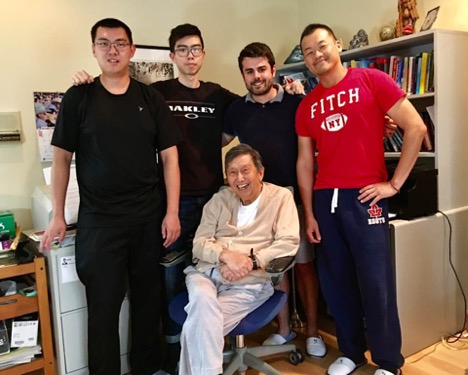 By God’s grace, I continue to receive invitations to speak internationally, although I have to limit my travels and decline most of them. However, I love to mentor doctoral and postdoctoral students on projects related to my research expertise. At present, I am working with three postdocs and several graduate students in different countries, including China.
By God’s grace, I continue to receive invitations to speak internationally, although I have to limit my travels and decline most of them. However, I love to mentor doctoral and postdoctoral students on projects related to my research expertise. At present, I am working with three postdocs and several graduate students in different countries, including China.
David F. Carreno from Spain (in the middle of the photo to the right) and Andrew Chen from Taiwan (at the far right of the photo) are currently working on their dissertations here in Canada for a few weeks. It has been such a pleasure seeing them several days per week working hard on their writing in my home and giving them the needed guidance. David came on a scholarship and Andrew is self-supporting; I wish I had the funding to support graduate students and postdocs.
The other two Chinese young men are my assistants. On the far left is Timothy Tan, responsible for filming and editing the videos for my Meetup sessions. Next to him is Timothy Yu, my research assistant. The young men will be the future of INPM.
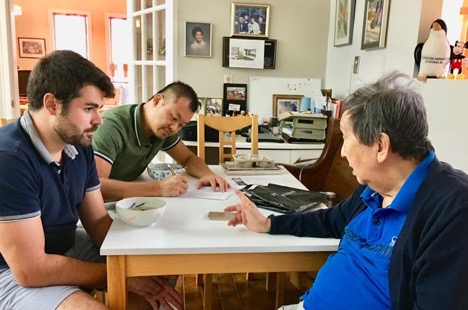 In addition, I am also working with a number of people from other counties to introduce second wave positive psychology (PP 2.0) and integrative meaning therapy to more people. It really breaks my heart to see so many able-bodied and well-educated young people ruin their lives with their blind pursuit of pleasure and money, which can neither fill their inner void nor take away their pain. I wish that more people could learn the power of meaning in healing and transforming lives.
In addition, I am also working with a number of people from other counties to introduce second wave positive psychology (PP 2.0) and integrative meaning therapy to more people. It really breaks my heart to see so many able-bodied and well-educated young people ruin their lives with their blind pursuit of pleasure and money, which can neither fill their inner void nor take away their pain. I wish that more people could learn the power of meaning in healing and transforming lives.
Another aspect of my international outreach is to answer numerous email requests each week from students around the world asking for permission and/or guidance on using the psychology measures that I have developed. Occasionally, there are more serious questions about theory and research in psychology.
I do all of the above both as a labour of love and as a responsibility to the younger generation. I wish that I had had a mentor like myself when I was student.
My (Mis)adventures in My Teaching Career
Contrary to most people who seek an upward career path, my career path followed the opposite direction by choice.
First, I resigned from the University of Texas at Austin in spite of Dr. Janet Spence’s advice for me to stay. I ended up accepting a one-year sabbatical replacement position at York University, Toronto; they paid for all the expenses moving me from Texas to Toronto. I accepted this as a sign of God’s approval.
Secondly, I accepted an offer from Trent University in Peterborough, and withdrew my application to the University of Colorado at Denver, where I was being considered for a position. As soon as I arrived in Peterborough, a retired missionary welcomed me and said that they had been praying for someone like me for years to start a Chinese ministry there. I am glad that I was able to start with a campus Bible study group, ministering to foreign students, and later the Peterborough Chinese Christian Fellowship with Sunday services and Friday Bible Study. In spite of all these Christian services that I was involved in, I was still the fastest promoted professor at Trent because of the merit increments I received for excellence in research and teaching. I mention this to demonstrate that God rewards those who are willing to serve Him wholeheartedly.
Thirdly, I resigned from Trent in order to serve God 100% by teaching at a Christian university. The biggest challenge teaching at Trinity Western University was not that my teaching load was more than double and my salary was less than half, but rather that I was not part of the university budget—I was told that if I failed to attract enough students to cover my salary and all the expenses, then the new program would be cancelled and I would be out of a job.
No sensible person would take on such a job, but I had God on my side. Once again, God came to my help. As the founder and director of the first graduate program at TWU, my graduate Counselling Psychology Program scored several firsts: the fastest growing department, the first department in Canada to be accredited CACREP, and the first department at TWU to receive a major research grant from the government. In spite of such successes, the administration wanted to kill the goose that laid the golden egg; they planned to discontinue our M.A. in Counselling Psychology Program to make us part of their seminary’s less marketable Master’s in Divinity Program within a span of only two weeks. To save the program, I mobilized my students to protest and threatened to sue them before they dropped the plan. But that did not stop the seminary from continually harassing me and my program. As a result, I resigned from my position and the seminary celebrated their success in forcing me out.
I am grateful that throughout my ordeal fighting for my political survival at TWU, Dr. Don Page, Vice-President Academic, was my staunch supporter. We had a very productive relationship in doing a servant leadership program, and the Servant Leadership Profile I helped develop has been quite impactful.
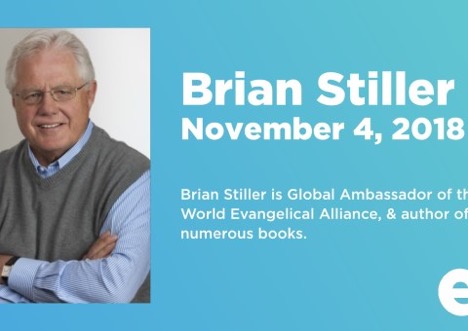 Fourthly, shortly after my resignation, Dr. Brian Stiller, former President of Tyndale University College and Seminary, invited me to duplicate my TWU success at Tyndale by establishing an Honours Psychology Program and an M.A. in Counselling Psychology Program there. At the same time, the University of Hawaii also offered me a job to be the Director of Counselling Psychology at their Hilo campus and a position on the faculty of their Ph.D. program at the Manoa campus. Consistent with my past practice, I turned down the University of Hawaii’s offer and accepted Tyndale’s offer, knowing that I would be again facing problems from their seminary.
Fourthly, shortly after my resignation, Dr. Brian Stiller, former President of Tyndale University College and Seminary, invited me to duplicate my TWU success at Tyndale by establishing an Honours Psychology Program and an M.A. in Counselling Psychology Program there. At the same time, the University of Hawaii also offered me a job to be the Director of Counselling Psychology at their Hilo campus and a position on the faculty of their Ph.D. program at the Manoa campus. Consistent with my past practice, I turned down the University of Hawaii’s offer and accepted Tyndale’s offer, knowing that I would be again facing problems from their seminary.
Within three years, I was able to establish a growing Honours Psychology Program, tripling the enrollment. Then, I submitted a plan for the Graduate Program. Unfortunately, at that time, Brian Stiller had just finished his term as President, and he was not able to prevent the seminary from establishing a new rule that only the seminary could offer graduate programs, effectively killing the M.A. in Counselling Psychology Program even before it was born. As a result, I resigned from Tyndale.
As soon as I resigned, invitations to speak from different parts of the world began to come in. Thus, God turned a bad situation into a blessing, and I became an international teacher.
Fifthly, after I left Tyndale, I was invited to be Vice-President Academic of an Adlerian Graduate School, whose application for government approval had been stalled for two years. I am glad that, with my credentials and experience, I was able to help them get approval for their M.A. program from the Ontario government.
I thought that I would finally have an academic home for my meaning-focused approach to counselling, which is very similar to the Adlerian approach of emphasizing meaning and social interest. Once again, I was betrayed. I was told by the Vice-President of Finance that my contract had no value, because they had no money for my salary. Each month, they had to pay all the expenses, such as rental fees, salary for the receptionist, and dividends for the investors first—my wife (as Dean of Students) and I (as Vice-President Academic) could only take whatever was left in the pot, despite our heavy administrative and teaching loads. We just cut our losses and said goodbye.
After the Adlerian experience, I knew that the only option left was to start a degree-granting institute to teach Integrative Meaning Therapy. God has to perform another miracle to make this happen. Although I have had several successes in “making bricks without straw”, since I am now in my 80s, I have to wait for the younger generation to fulfill this vision of mine.
Racism in Canada
The main problem I have encountered in teaching in Canada is racism, which has doggedly followed me throughout my teaching career.
While I was at Trent, one student sent me a note saying, “You should go back to China”; another student complained to the Chair that her “low mark in her essay was caused by Prof. Wong’s Chinese accent”; and a white man wrote letters to the federal granting agency and politicians stating that they should not waste tax dollars to support my research on the well-being of elderly Chinese people in Canada. After this last complaint, I was not able to get another grant from the same agency.
The most painful experience I had was the year the student council chose to publish one student’s comment that I was a sexist and a racist in the student newspaper, while ignoring hundreds of positive comments I had received in student evaluations. After I complained to the Dean, student council retracted that statement, but the damage had already been done.
While at TWU, I received several letters attacking me as an “anti-gay” bigoted racist, even though my Counselling Psychology Program invited a gay Christian each year to educate us to better understand and counsel homosexual clients. The administration even invited the RCMP to investigate who had sent me such hate mail.
I am glad that another Paul Wong recently made a film about his experience of racism in Canada. Unfortunately, racism will always be here. There is nothing I can do to make people treat me fairly as a fellow human being, but I certainly can continue to teach people the virtue and value of fairness. It is not surprising that my measure of meaning in life includes a subscale assessing perceived fairness. For most people, life is less meaningful when they are treated as second-class citizens. It is only though God’s grace that I was able to transcend racism in teaching and research.
 Looking back, I have accomplished more than I ever expected, given all the adverse circumstances I endured. Therefore, I can only glorify God, for He has done the impossible in my life.
Looking back, I have accomplished more than I ever expected, given all the adverse circumstances I endured. Therefore, I can only glorify God, for He has done the impossible in my life.
I self-identify as a teacher. Teaching is my nature and my calling. I cannot be anything else. Whether I am doing research, writing, providing therapy, giving a workshop, preaching, or praying, I am doing the same thing—teaching others how to live a happy and healthy life by transforming suffering and developing their best to serve the common good and a higher purpose. My meaning in life is to be like a candle—consuming itself in order to give light to others.
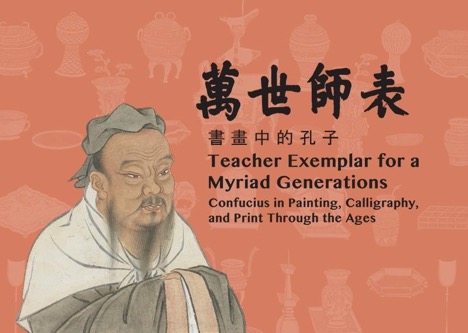
 Meaning Conference 2025 will be the INPM’s first in-person conference with a virtual option after the pandemic.
Meaning Conference 2025 will be the INPM’s first in-person conference with a virtual option after the pandemic.